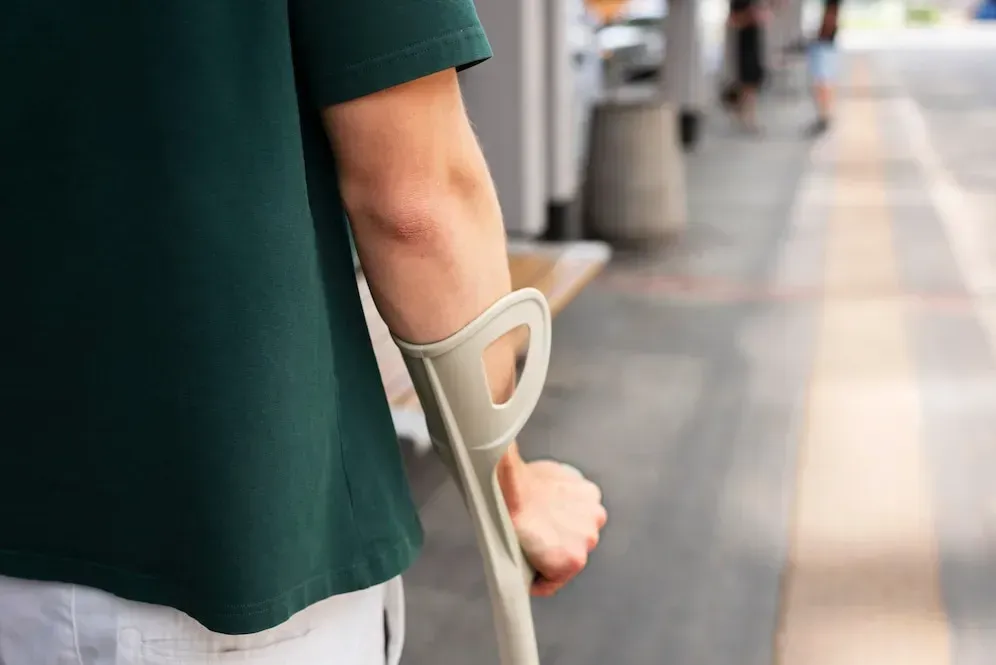BLOG

Personal Injury Law: Protecting Your Rights After an Accident | Chicago
When life takes an unexpected turn and you find yourself injured because of someone else's carelessness, the path forward can seem unclear. Many people feel lost in the maze of medical bills, insurance claims, and legal procedures that follow an accident.
Personal injury law exists to protect your rights and help you get fair compensation when you're hurt because of another person's negligence. These laws make sure that victims don't have to shoulder the burden of medical costs, lost wages, and other damages alone when someone else is at fault.
The journey to recovery – both physical and financial – starts with understanding your rights. This knowledge is your shield and your strength as you navigate the challenges that come after an injury.
The Foundation of Personal Injury Claims
Personal injury claims rest on the idea of negligence. When someone fails to act with reasonable care and causes harm to another person, they may be legally responsible for the resulting damages.
Common types of personal injury cases include:
Car accidents when drivers don't follow traffic rules
Slip and fall incidents on unsafe property
Medical malpractice when healthcare providers make mistakes
Dog bites from pets not properly controlled
Workplace accidents due to unsafe conditions
Defective products that cause harm when used as intended
For a successful claim, you must show that someone had a duty to act carefully, they failed in that duty, this failure caused your injury, and you suffered real damages as a result.
Steps to Take After an Injury
The actions you take right after an injury can make or break your case. Here's what to do:
Get medical help right away. Your health comes first, and medical records serve as key evidence.
Report the incident. Tell the property owner, manager, or police about what happened.
Gather evidence. Take pictures of the accident scene, your injuries, and anything else that might be important.
Get witness information. Names and contact details of people who saw what happened can help back up your story.
Keep all documents. Save medical bills, repair estimates, and records of missed work.
Watch what you say. Don't admit fault or make statements to insurance companies without talking to a lawyer first.
Talk to a personal injury lawyer. A good lawyer will guide you through the legal process and fight for your rights.
The Crucial Role of Medical Documentation
After an injury, your medical records become the backbone of your claim. These documents tell the story of your injuries and connect them to the accident.
See your doctor right away, even if you think your injuries are minor. Some problems, like head injuries or internal damage, might not show symptoms right away but can get worse over time.
Follow your doctor's advice about treatment and follow-up care. Missing appointments or ignoring medical advice can hurt your claim because insurance companies might say you made your injuries worse.
Medical documentation helps figure out how much money you should get for your pain and suffering, which is harder to measure than medical bills or lost wages.
Calculating What Your Claim is Worth
Many injured people wonder: What is my case worth? While every situation is different, compensation in personal injury cases may include:
Medical expenses (past and future)
Lost wages from time away from work
Loss of earning capacity if you can't return to your job
Property damage costs
Pain and suffering
Emotional distress
Loss of enjoyment of life
Loss of consortium (impact on relationships)
Insurance companies often try to pay as little as possible. They might make a quick, low offer hoping you'll take it before talking to a lawyer.
Don't fall for this trap. A personal injury lawyer can help figure out what fair compensation looks like in your case.
[For a deeper dive into this topic, read our guide on "Calculating Damages in Personal Injury Claims."]
Time Limits for Filing a Claim
Time is not your friend when it comes to personal injury claims. Every state has a "statute of limitations" – a time limit for filing a lawsuit after an injury.
In most places, this period ranges from one to three years. If you miss this deadline, you may lose your right to seek compensation forever.
Sometimes the clock starts ticking on the date of the accident. Other times, it starts when you first discover your injury. The rules can be tricky, which is why talking to a lawyer early is so important.
Why Having a Personal Injury Lawyer Matters
The legal system can be hard to understand if you're not trained in it. A personal injury lawyer serves as your guide, advocate, and protector through this complex process.
A good lawyer will:
Explain your rights in clear, simple terms
Handle communications with insurance companies
Gather evidence to strengthen your case
Work with medical experts to document your injuries
Negotiate for fair compensation
Take your case to court if needed
Many people worry about lawyer fees, but most personal injury lawyers work on a "contingency fee" basis. This means they only get paid if you win your case, usually taking a percentage of your settlement.
Common Insurance Company Tactics to Watch For
Insurance companies make money by taking in premiums and paying out as little as possible in claims. Be aware of these common tactics they use:
Making quick, low settlement offers before you know the full extent of your injuries
Asking for recorded statements they can use against you later
Requesting access to your entire medical history to find ways to deny your claim
Delaying the claims process, hoping you'll give up
Questioning the seriousness of your injuries
Suggesting that your injuries existed before the accident
A lawyer who knows these tactics can help you avoid these traps and fight for fair treatment.
What Makes a Valid Personal Injury Case?
Not every accident leads to a personal injury claim. For a valid case, certain elements must be present:
Someone owed you a duty of care
They failed to meet that duty (negligence)
Their negligence directly caused your injury
You suffered actual damages as a result
The strength of your case depends on evidence, the clarity of fault, the extent of your injuries, and how these injuries have affected your life.
Choosing the Right Legal Help for Your Situation
When you're hurt and dealing with medical issues, finding the right lawyer might seem overwhelming. But having skilled legal help can make all the difference in your recovery journey.
For over 30 years, the Law Offices of John A. Culver has helped injury victims in Chicago stand up for their rights. Our team of experienced lawyers understands what you're going through and knows how to fight for the compensation you deserve.
Whether you've been hurt in a car accident, by medical malpractice, or through a defective product, we have the knowledge and skills to help. Our approach combines legal expertise with genuine care for our clients' wellbeing.
If you or a loved one has suffered an injury due to someone else's negligence, contact the Law Offices of John A. Culver today for a free consultation. Let us help you protect your rights and start on the path to recovery.
Call us now to speak with a dedicated personal injury attorney who will listen to your story and explain your options in clear, straightforward terms.
COMING SOON

The Law Offices of John A. Culver offers over 3 decades of legal experience defending and prosecuting civil actions on behalf of a variety of clients, including numerous jury trials.

